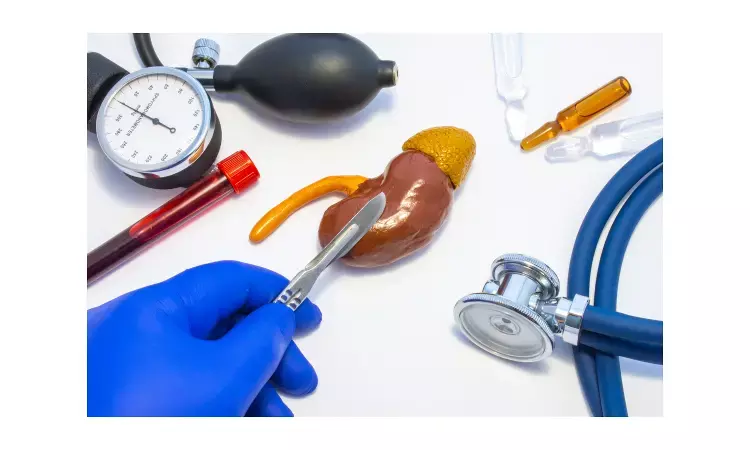- Home
- Medical news & Guidelines
- Anesthesiology
- Cardiology and CTVS
- Critical Care
- Dentistry
- Dermatology
- Diabetes and Endocrinology
- ENT
- Gastroenterology
- Medicine
- Nephrology
- Neurology
- Obstretics-Gynaecology
- Oncology
- Ophthalmology
- Orthopaedics
- Pediatrics-Neonatology
- Psychiatry
- Pulmonology
- Radiology
- Surgery
- Urology
- Laboratory Medicine
- Diet
- Nursing
- Paramedical
- Physiotherapy
- Health news
- Fact Check
- Bone Health Fact Check
- Brain Health Fact Check
- Cancer Related Fact Check
- Child Care Fact Check
- Dental and oral health fact check
- Diabetes and metabolic health fact check
- Diet and Nutrition Fact Check
- Eye and ENT Care Fact Check
- Fitness fact check
- Gut health fact check
- Heart health fact check
- Kidney health fact check
- Medical education fact check
- Men's health fact check
- Respiratory fact check
- Skin and hair care fact check
- Vaccine and Immunization fact check
- Women's health fact check
- AYUSH
- State News
- Andaman and Nicobar Islands
- Andhra Pradesh
- Arunachal Pradesh
- Assam
- Bihar
- Chandigarh
- Chattisgarh
- Dadra and Nagar Haveli
- Daman and Diu
- Delhi
- Goa
- Gujarat
- Haryana
- Himachal Pradesh
- Jammu & Kashmir
- Jharkhand
- Karnataka
- Kerala
- Ladakh
- Lakshadweep
- Madhya Pradesh
- Maharashtra
- Manipur
- Meghalaya
- Mizoram
- Nagaland
- Odisha
- Puducherry
- Punjab
- Rajasthan
- Sikkim
- Tamil Nadu
- Telangana
- Tripura
- Uttar Pradesh
- Uttrakhand
- West Bengal
- Medical Education
- Industry
Nephrectomy in trauma patients associated with higher mortality rate: Study

USA: A new study by S. Mitchell Heiner and team revealed that nephrectomy was associated with higher mortality in the acute trauma setting even when controlling for shock, head injury, and overall injury severity. The findings of the study are published in the journal Urology.
Most studies report death rates for donor nephrectomy in the range of 1 or 2 per 10,000 donor surgeries. It is said initial management of solid organ injuries in hemodynamically stable patients is non-operative. The objective of the study was to test the hypothesis that undergoing nephrectomy after high-grade renal trauma is associated with higher mortality rates.
The study was a survey that gathered data from 21 Level-1 trauma centers through the Multi-institutional Genito-Urinary Trauma Study. Patients with high-grade renal trauma were included. The association between nephrectomy and mortality in all patients and in subgroups of patients after excluding those who died within 24 hours of hospital arrival and those with GCS≤8 was assessed. Age, injury severity score (ISS), shock (systolic blood pressure <90 mmHg), and Glasgow Coma Scale (GCS) was controlled. A total of 1181 high-grade renal trauma patients were included. The median age was 31 and trauma mechanism was blunt in 78%
The results of the study were:
• Injuries were graded as III, IV, and V in 55%, 34%, and 11%, respectively. There were 96 (8%) mortalities and 129 (11%) nephrectomies.
• Mortality was higher in the nephrectomy group (21.7% vs 6.5%). Those who died were older, had higher ISS, lower GCS, and higher rates of shock.
• After adjusting for patient and injury characteristics nephrectomy was still associated with a higher risk of death (RR: 2.12).
Heiner and team concluded that their study pointed out nephrectomy was associated with higher mortality in the acute trauma setting even when controlling for shock, overall injury severity, and head injury. These results may have implications in decision making in acute trauma management for patients not in extremis from renal hemorrhage.
Reference: DOI:https://doi.org/10.1016/j.urology.2021.07.033
Medical Dialogues consists of a team of passionate medical/scientific writers, led by doctors and healthcare researchers. Our team efforts to bring you updated and timely news about the important happenings of the medical and healthcare sector. Our editorial team can be reached at editorial@medicaldialogues.in.
Dr Kamal Kant Kohli-MBBS, DTCD- a chest specialist with more than 30 years of practice and a flair for writing clinical articles, Dr Kamal Kant Kohli joined Medical Dialogues as a Chief Editor of Medical News. Besides writing articles, as an editor, he proofreads and verifies all the medical content published on Medical Dialogues including those coming from journals, studies,medical conferences,guidelines etc. Email: drkohli@medicaldialogues.in. Contact no. 011-43720751


